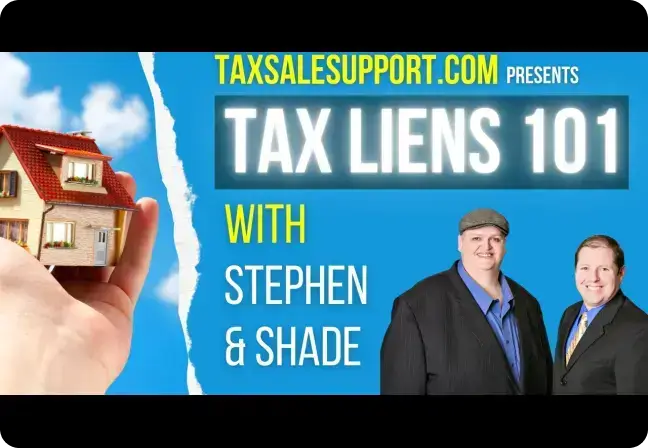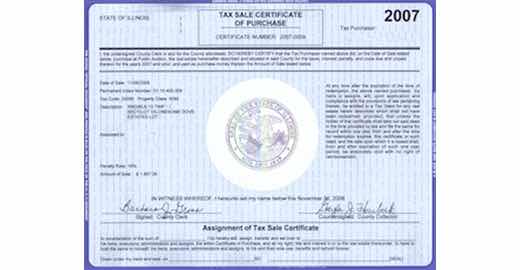All Categories
Featured
Table of Contents
If you are interested in the tax obligation lien foreclosure process, you need to call an attorney so you understand and evaluate the dangers of this sort of investment. - how does investing in tax liens work
Tax obligation lien sales are one way that cities and regions try to recover some of the public dollars they've invested keeping these buildings deserted by private proprietors. As we'll clarify in this post,. When property taxes are thought about delinquent, city governments commonly concentrate on providing notice of delinquency and trying to accumulate the unsettled quantities from the owner.
Nevertheless, this procedure normally takes years. If an owner has actually left and is resistant to pay taxes or maintain the property, the city has to spend tax obligation bucks to keep the building. These costsboarding up the building, mowing disordered grass and weeds, replying to fire and authorities calls on the residential or commercial property, and moreadd up

Owners who have fallen on difficult times definitely require every effort to keep them out of delinquency and in their homes. Typically, if the building is vacant and worn-out, we should presume the proprietor has actually picked to desert their rate of interest in the residential or commercial property and that they are "reluctant" to pay (though conditions earlier in the process might have required their hand).
Investing In Tax Liens In Texas
Take, as an example, a single-family home where the owner has actually time out of mind left. For many years the city government has actually had to tip in and eliminate garbage unloaded in the yard, board up the doors and home windows, and respond to calls concerning illegal activity on the building. All these solutions cost the neighborhood government taxpayer dollars.
In lots of states, those expenses can be gathered in the exact same manner as the unsettled taxes, however not in all. (Something that Community Development strongly advocates for.) Ultimately, the overall financial debt becomes higher than what the property can sell for. In a tax lien sale (or tax obligation certification sale) the neighborhood government commonly holds a public auction where the winning prospective buyer accepts pay one of the most cash for the right to apply the tax lien, starting with a minimal bid of at the very least the taxes had, plus applicable rate of interest, charges, and expenses.

When a federal government markets the tax obligation lien they are generally marketing to a personal buyer the city government's authority to collect the financial obligation for ahead of time repayment of the tax obligations owed. The buyer's purchase typically includes the capacity to make future interest, along with recoup relevant charges and prices sustained by the buyer, if the homeowner pays the tax obligation financial obligation.
This is, fundamentally, privatization of a core federal government function: tax obligation collection. Tax obligation lien sales are particularly negative when it involves vacant, abandoned, and shabby buildings because they prolong the duration before a residential or commercial property can be relocated right into the hands of a brand-new, a lot more responsible proprietor. Personal tax lien purchasers hold the financial obligation, however they do not possess the titlethe legal right to ownership of the propertyand in most cases, they have no interest in obtaining it.
What Is Tax Lien Investing
Thinking about budget cuts, local governments in several states have actually lowered in-house real estate tax collection and enforcement efforts and wanted to tax lien sales as a fast mixture of profits - certificate investment lien tax (tax lien investing software). Numerous counties pick or are mandated by the state to sell tax liens since it contracts out collection and frequently brings in extremely required cash money earlier in the collection procedure
By moving the local government's interest in and enforcement of the tax lien to a personal buyer, city governments lose a lot of their flexibility: adaptability to get vacant homes that the private market does not desire, or to help the owner avoid shedding their home. With vacant homes, there is a much greater possibility that the exclusive customer isn't thinking about the property itself.
Tax lien sales can create injury in traditionally disinvested areas. In a clinically depressed housing market, less proprietors have the ability to retrieve the quantity of the debt marketed to a tax obligation lien purchaser. These locations are ripe for a various sort of tax obligation lien investorspeculative owners looking for to acquire homes on the low-cost by confiscating on the real estate tax lien, milking what little equity is left by leasing a low-grade residential or commercial property to prone occupants, and then abandoning the residential property when they have actually gained back their investment.

Not all state regulations give city governments the power to interfere in this cycle. Regardless, the home remains uninhabited and in limbo, all the while enforcing substantial expenses on its neighbors and taxpayers. It's understandable that lots of city governments turn to tax obligation lien sales due to the fact that they aid money necessary public solutions.
If the local government instead offers the residential or commercial property (also known as the "tax obligation act"), instead of the tax financial debt, then they are in control of what takes place to the residential or commercial property and the enforcement process if the proprietor remains to not pay the real estate tax owed. The federal government will certainly provide the proprietor a practical time to repay the tax obligation financial debt, after which the government will seize its interest in the tax lien and the proprietor's right of redemption.
From their inception, these auctions were venues for financiers to profit with exploitation. In very early 20th-century cities, notorious "tax sharks" like Chicago's Jacob Glos and New york city's Charles Wiltsie accumulated ton of money by buying up ratings of tax liens on household buildings, charging their owners exorbitant total up to eliminate the lien, or waiting till the due date for negotiation passed and asserting the act.
Tax Lien Investments

Calls to eliminate tax lien sales and overhaul tax obligation delinquency legislations have occasionally erupted. Usually, they have come in feedback to situations of poor, frequently senior home owners who shed their homes to unscrupulous tax customers over small tax debts. But with a few exemptions, state legislatures have withstood structural reforms.
Those that have paid off their home mortgages (primarily seniors or persons who had actually inherited a family home) must also locate the cash to pay real estate tax. This clarifies why 70 percent of the homes offered at tax lien sales are had outright. It is well previous time for states to adopt a more humaneand a lot more effectivesystem for home tax obligation enforcement.
Table of Contents
Latest Posts
Excess Sales
Unpaid Property Taxes Near Me
Tax Auction Homes Near Me
More
Latest Posts
Excess Sales
Unpaid Property Taxes Near Me
Tax Auction Homes Near Me